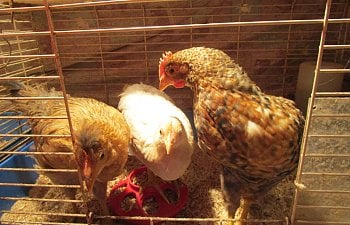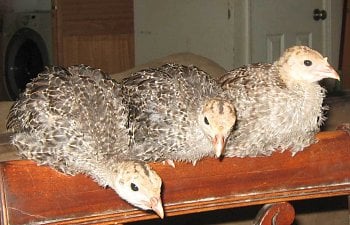If you ask any poultry keeper, they will probably give you a list of things they would have done differently. Everyone has made mistakes at one point or another, some of them are harmless, but others can lead to your birds getting seriously injured, or even killed. Hopefully, you can learn from some of these common mistakes, and prevent them from happening to you.
- Not noticing a sick bird in time
Symptoms of ill birds include:
Moving slowly, and not interested in food or treats
Refusing to come out of the coop in the morning
Not eating or drinking
Huddling on the roost or floor during the day with closed eyes
Head pulled tightly in
Droopy wings and tail
Heavy or strained breathing
Decreased egg production
Straining
Acting lethargic
Ruffled feathers (Keep in mind that hens will sometimes ruffle their feathers when cold)
Pale or purple comb, and wattles
Cloudy, leaky, swollen, or watery eyes
Sneezing, wheezing, or coughing
Swollen legs or feet
When you have a sick or injured bird, it is best to separate it as soon as possible. Inspect the ill bird's weight, vent, face, mouth, and nostrils and look it over for blood, scabs, and other signs of injury. Also, check for mites and lice, and expect the bird's legs for scaly leg mites.
Typical look of a sick bird. This hen most likely died of some kind of internal injury.
- Using toxic chemicals around the coop
Most chemicals, pesticides, herbicides, and pest poisons, are deadly to your birds. It is best to avoid using such items around your coop, run, or anywhere in your birds' range. Even if you put out rats or other rodent poisons where you are sure your birds will not get it, your birds may find and eat the dead or dying rat, in which case the birds may ingest the poison that way.
If you spray weeds or grass around your coop, or anywhere in your birds' range, they may eat than it, and ingest the chemicals, which can cause illness or death to your birds. It is best to use such chemicals sparingly and with caution around your flock.
- Buying birds from an unknown source/dishonest breeder
For more on buying birds, read this article: https://www.backyardchickens.com/a/tips-for-purchasing-birds-from-a-breeder
When adding birds to your flock, it is a good idea to quarantine them for a little while before adding them to the rest of your flock: https://www.backyardchickens.com/a/...often-underestimated-part-of-raising-chickens
- Overcrowding and/or overheating your chicks in the brooder
Observing mother hens has convinced me that baby chicks do not need as much heat as we are often told. I have seen many a mother hen out scratching with her chicks on 20F and 30F degree mornings, and even one hen and her 2-week old chick out eating on a 5F degree morning! Don't get me wrong, chicks do need to be kept warm, but they don't need to roast under a heat lamp, all the time. Chicks out with a mother hen, would go out and scratch for an hour or two, and then come and warm up before going out to eat and scratch again. As they get older, the time spent out eating and scratching will increase. Chicks that are kept in a heated brooder all the time have far less tolerance to cold temps and often are poor winter layers. When setting up or constructing your brooder, make sure that your babies have a place where they can get out from under the heat. Observe them closely and make sure they are comfortable. As long as you are not getting temps 30F's or below, your chicks should be ready to leave the brooder by the time they are fully feathered out.
- Keeping birds in a dirty/poorly ventilated/dark coop
Here are a couple of articles on the subject:
https://www.backyardchickens.com/a/bedding-part-2-maintaining-your-bedding
https://www.backyardchickens.com/a/...-go-out-there-and-cut-more-holes-in-your-coop
Good, clean bedding is a must.
- Not predator proofing your coop
Note: Check out the ''Coop & Run: Design, Construction, & Maintenance'' section of this forum for more on the subject of predator-proofing your coop.
- Not buying/building a big enough coop
- Not picking the right breed
Decide carefully on what breed(s) you want. For example, if you want pets, don't buy a breed known for being flighty. Keep climate in mind too, and pick a breed that does well where you live.
Handling your birds is also a good idea to get them accustomed to you
- Be prepared for emergencies
Here is some help that will help you get a first aid kit started:
https://www.backyardchickens.com/a/...dy-and-essential-supplies-and-how-to-use-them
I hope this article helps you have a better experience with your birds! If you have any questions, comments, or would like to add anything to this list, feel free to post below, or PM me.
Thanks for reading!



